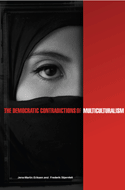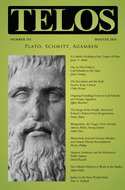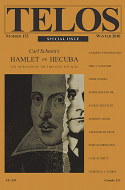By Telos Press · Monday, January 30, 2012 Telos Press is pleased to announce the upcoming publication of The Democratic Contradictions of Multiculturalism by Jens-Martin Eriksen and Frederik Stjernfelt. This title will be available on March 1, 2012. Pre-order your copy now, and we will ship it to you as soon as it is available. Save 20% when you purchase on the Telos Press website.
 What is multiculturalism? Is it every person’s right in a democratic society to choose his or her religion and culture and to express criticism regardless of taboos and moralistic norms? Or is it, on the contrary, the right of cultures and religions to be protected from insult and to preserve themselves against change? In The Democratic Contradictions of Multiculturalism, Jens-Martin Eriksen and Frederik Stjernfelt examine these questions in relation to both the ideology and the reality of multiculturalism. The discussion covers a range of issues, including the Muhammad cartoons, laws against blasphemy, hijab, the Islamic ban on apostasy, and the limits of the freedom of religion. What is multiculturalism? Is it every person’s right in a democratic society to choose his or her religion and culture and to express criticism regardless of taboos and moralistic norms? Or is it, on the contrary, the right of cultures and religions to be protected from insult and to preserve themselves against change? In The Democratic Contradictions of Multiculturalism, Jens-Martin Eriksen and Frederik Stjernfelt examine these questions in relation to both the ideology and the reality of multiculturalism. The discussion covers a range of issues, including the Muhammad cartoons, laws against blasphemy, hijab, the Islamic ban on apostasy, and the limits of the freedom of religion.
Continue reading →
By Peter A. Redpath · Friday, January 27, 2012 Peter A. Redpath’s “Justice in the New World Order: Reduction of Justice to Tolerance in the New Totalitarian World State” appears in Telos 157 (Winter 2011). Read the full version online at the TELOS Online website, or purchase a print copy of the issue here.
 This article’s general thesis is that, shortly after World War II, some leading Western intellectuals started to work to build a new world order based upon a modified understanding of national sovereignty and a notion of justice that rejected Machiavellianism. It claims that during the 1960s, this project became hijacked by Western socialists and was turned toward undermining the authority of national constitutions and legal traditions and promoting Machiavellianism on a global scale. Socialists effected this transformation by wedding Nietzsche’s Machiavellianism to Rousseau’s teaching about morality. From Rousseau they adopted the notion of “tolerance”—having the right feelings and right way of reading history about an exploited, sinless, innocent class (the proletariat under communism)—to replace the classical notion of justice as a moral, behavioral, quality (habitually behaving rightly toward other people) in human affairs. Of crucial significance is that, in the process, they changed the West’s understanding of justice from a classical moral category related to behaving rightly toward others into a hermeneutical category of having the right political reading of history. This article’s general thesis is that, shortly after World War II, some leading Western intellectuals started to work to build a new world order based upon a modified understanding of national sovereignty and a notion of justice that rejected Machiavellianism. It claims that during the 1960s, this project became hijacked by Western socialists and was turned toward undermining the authority of national constitutions and legal traditions and promoting Machiavellianism on a global scale. Socialists effected this transformation by wedding Nietzsche’s Machiavellianism to Rousseau’s teaching about morality. From Rousseau they adopted the notion of “tolerance”—having the right feelings and right way of reading history about an exploited, sinless, innocent class (the proletariat under communism)—to replace the classical notion of justice as a moral, behavioral, quality (habitually behaving rightly toward other people) in human affairs. Of crucial significance is that, in the process, they changed the West’s understanding of justice from a classical moral category related to behaving rightly toward others into a hermeneutical category of having the right political reading of history.
Continue reading →
By James V. Schall · Tuesday, January 24, 2012 James V. Schall’s “A Catholic Reading of the Gorgias of Plato” appears in Telos 157 (Winter 2011). Read the full version online at the TELOS Online website, or purchase a print copy of the issue here.
 The Gorgias of Plato is of particular interest to political philosophy. Not only is there a detailed discussion of punishment and oratory, but also of practical political ways of action and their foundation. This dialogue is of particular worth for the Roman Catholic notion of the relation of reason and revelation. Political life leaves us with the notion that not all crimes are punished, nor are all good deeds rewarded. This fact leaves the Platonic concern of whether the world is created in injustice. The myth at the end of the Gorgias suggests that politicians are the ones most likely to cause extensive damage and evil in the world. It also argues that unless such deeds are suffered for, thus righting the principle, they will be punished. This consideration naturally leads to the issue of resurrection, an issue about which even Marxist-oriented philosophers like Adorno and Horkheimer saw the logic. The Gorgias of Plato is of particular interest to political philosophy. Not only is there a detailed discussion of punishment and oratory, but also of practical political ways of action and their foundation. This dialogue is of particular worth for the Roman Catholic notion of the relation of reason and revelation. Political life leaves us with the notion that not all crimes are punished, nor are all good deeds rewarded. This fact leaves the Platonic concern of whether the world is created in injustice. The myth at the end of the Gorgias suggests that politicians are the ones most likely to cause extensive damage and evil in the world. It also argues that unless such deeds are suffered for, thus righting the principle, they will be punished. This consideration naturally leads to the issue of resurrection, an issue about which even Marxist-oriented philosophers like Adorno and Horkheimer saw the logic.
Continue reading →
By Mark Chou · Friday, January 20, 2012 Mark Chou’s “Morgenthau, the Tragic: On Tragedy and the Transition from Scientific Man to Politics Among Nations” appears in Telos 157 (Winter 2011). Read the full version online at the TELOS Online website, or purchase a print copy of the issue here.
 When Hans J. Morgenthau first penned Scientific Man vs. Power Politics, it was his scorn of modern science or “dogmatic scientism,” as he put it, that spoke most loudly. But with the publication of Politics Among Nations several years later, his concerns had shifted, as he set about to present a rational theory of international politics. In a matter of only two years, or so it seemed, Morgenthau’s tune had changed—from a clear denunciation of science to the espousal of a nascent science of International Relations. Why did Morgenthau so vehemently decry dogmatic scientism and all that it embodied in Scientific Man, only to establish a theory of international politics that would eventually inspire the “science” of International Relations? The answer, at least the one that this article entertains, was tragedy. Using the lens of tragedy, which Morgenthau first embraced in Scientific Man, this article offers a narrative of the seemingly paradoxical transition that occurs between Scientific Man and Politics Among Nations. When Hans J. Morgenthau first penned Scientific Man vs. Power Politics, it was his scorn of modern science or “dogmatic scientism,” as he put it, that spoke most loudly. But with the publication of Politics Among Nations several years later, his concerns had shifted, as he set about to present a rational theory of international politics. In a matter of only two years, or so it seemed, Morgenthau’s tune had changed—from a clear denunciation of science to the espousal of a nascent science of International Relations. Why did Morgenthau so vehemently decry dogmatic scientism and all that it embodied in Scientific Man, only to establish a theory of international politics that would eventually inspire the “science” of International Relations? The answer, at least the one that this article entertains, was tragedy. Using the lens of tragedy, which Morgenthau first embraced in Scientific Man, this article offers a narrative of the seemingly paradoxical transition that occurs between Scientific Man and Politics Among Nations.
Continue reading →
By Charles Kollmer · Thursday, January 19, 2012 As an occasional feature on TELOSscope, we highlight a past Telos article whose critical insights continue to illuminate our thinking and challenge our assumptions. Today, Charles Kollmer looks at Stephanie Frank’s “Re-imagining the Public Sphere: Malebranche, Schmitt’s Hamlet, and the Lost Theater of Sovereignty,” from Telos 153 (Winter 2010).

In “Re-imagining the Public Sphere: Malebranche, Schmitt’s Hamlet, and the Lost Theater of Sovereignty,” Stephanie Frank outlines a compelling approach to Carl Schmitt’s complex oeuvre. She sets out to rectify a common mistake made in existing treatments of Schmitt; in studies of Schmitt’s early work Roman Catholicism and Political Form (1923), scholars tend to rely on a later work, Constitutional Theory (1928), as an explanatory crutch. Both texts model representation, but a conflation of their respective models obscures how Schmitt’s project changes between the works. As a corrective, Frank traces the nuances of Roman Catholicism‘s model back to the influence of seventeenth-century theologian Malebranche, who in turn influenced the eighteenth-century revolutionary Abbé Sieyès. By grounding Roman Catholicism in this historical context, Frank not only sidesteps the circularity of her colleagues’ interpretations but also lays the groundwork for a persuasive reading of Schmitt’s turn to aesthetics in Hamlet or Hecuba (1956).
Continue reading →
By Wesley Phillips · Tuesday, January 17, 2012 Wesley Phillips’s “Melancholy Science? German Idealism and Critical Theory Reconsidered” appears in Telos 157 (Winter 2011). Read the full version online at the TELOS Online website, or purchase a print copy of the issue here.
 What is the relationship between theory and praxis today? During the 1960s, Adorno’s melancholy science was reproached with the charge of resignation, echoes of which have continued up to the present day—whether in Agamben or in praxis-oriented radical thought. In what is the most substantial critique to date, Gillian Rose initially sympathized with Adorno only to reject his neo-Kantian Marxism—the problem being that the melancholy science would involve a masochistically infinite task concerned with the recovery of an irretrievable utopia, leading to a methodological detachment from the social object. Understood in this way, the question of finite social praxis becomes an immanently philosophical matter. While following Rose’s orientation toward German idealism—for its imagined critique of neo-Kantianism and theory-ism—this article argues that, due to his unsatisfactory treatment of historical suffering, a return to Hegel alone (albeit after Marx) is insufficient. Rather, a dialectic of Hegel and his adversary Schelling suggests a distinctive account of determinate activity that avoids Melancholia without rejoicing the actuality of world spirit. This is made possible by way of an affinity between conceptions of melancholy and history in Schelling and Benjamin, from whom Adorno develops his traurige Wissenschaft. What is the relationship between theory and praxis today? During the 1960s, Adorno’s melancholy science was reproached with the charge of resignation, echoes of which have continued up to the present day—whether in Agamben or in praxis-oriented radical thought. In what is the most substantial critique to date, Gillian Rose initially sympathized with Adorno only to reject his neo-Kantian Marxism—the problem being that the melancholy science would involve a masochistically infinite task concerned with the recovery of an irretrievable utopia, leading to a methodological detachment from the social object. Understood in this way, the question of finite social praxis becomes an immanently philosophical matter. While following Rose’s orientation toward German idealism—for its imagined critique of neo-Kantianism and theory-ism—this article argues that, due to his unsatisfactory treatment of historical suffering, a return to Hegel alone (albeit after Marx) is insufficient. Rather, a dialectic of Hegel and his adversary Schelling suggests a distinctive account of determinate activity that avoids Melancholia without rejoicing the actuality of world spirit. This is made possible by way of an affinity between conceptions of melancholy and history in Schelling and Benjamin, from whom Adorno develops his traurige Wissenschaft.
Continue reading →
|
|
 What is multiculturalism? Is it every person’s right in a democratic society to choose his or her religion and culture and to express criticism regardless of taboos and moralistic norms? Or is it, on the contrary, the right of cultures and religions to be protected from insult and to preserve themselves against change? In The Democratic Contradictions of Multiculturalism, Jens-Martin Eriksen and Frederik Stjernfelt examine these questions in relation to both the ideology and the reality of multiculturalism. The discussion covers a range of issues, including the Muhammad cartoons, laws against blasphemy, hijab, the Islamic ban on apostasy, and the limits of the freedom of religion.
What is multiculturalism? Is it every person’s right in a democratic society to choose his or her religion and culture and to express criticism regardless of taboos and moralistic norms? Or is it, on the contrary, the right of cultures and religions to be protected from insult and to preserve themselves against change? In The Democratic Contradictions of Multiculturalism, Jens-Martin Eriksen and Frederik Stjernfelt examine these questions in relation to both the ideology and the reality of multiculturalism. The discussion covers a range of issues, including the Muhammad cartoons, laws against blasphemy, hijab, the Islamic ban on apostasy, and the limits of the freedom of religion.  This article’s general thesis is that, shortly after World War II, some leading Western intellectuals started to work to build a new world order based upon a modified understanding of national sovereignty and a notion of justice that rejected Machiavellianism. It claims that during the 1960s, this project became hijacked by Western socialists and was turned toward undermining the authority of national constitutions and legal traditions and promoting Machiavellianism on a global scale. Socialists effected this transformation by wedding Nietzsche’s Machiavellianism to Rousseau’s teaching about morality. From Rousseau they adopted the notion of “tolerance”—having the right feelings and right way of reading history about an exploited, sinless, innocent class (the proletariat under communism)—to replace the classical notion of justice as a moral, behavioral, quality (habitually behaving rightly toward other people) in human affairs. Of crucial significance is that, in the process, they changed the West’s understanding of justice from a classical moral category related to behaving rightly toward others into a hermeneutical category of having the right political reading of history.
This article’s general thesis is that, shortly after World War II, some leading Western intellectuals started to work to build a new world order based upon a modified understanding of national sovereignty and a notion of justice that rejected Machiavellianism. It claims that during the 1960s, this project became hijacked by Western socialists and was turned toward undermining the authority of national constitutions and legal traditions and promoting Machiavellianism on a global scale. Socialists effected this transformation by wedding Nietzsche’s Machiavellianism to Rousseau’s teaching about morality. From Rousseau they adopted the notion of “tolerance”—having the right feelings and right way of reading history about an exploited, sinless, innocent class (the proletariat under communism)—to replace the classical notion of justice as a moral, behavioral, quality (habitually behaving rightly toward other people) in human affairs. Of crucial significance is that, in the process, they changed the West’s understanding of justice from a classical moral category related to behaving rightly toward others into a hermeneutical category of having the right political reading of history. 


